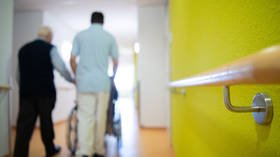When even tough New Yorkers become petrified pandemic-shamers, it’s time to confront our over-anxiousness about Covid-19

The only thing to fear is fear itself… and coronavirus. Our response to this disease stems from a very Western form of privilege.
As someone who has been writing about social media movements for many years, I can tell you that they always follow the same formula. They start out with good intentions, then quickly devolve into a method of feeling superior by demonizing others. The Covid-19 pandemic has been no different.
Back in early March, it was useful to have people explain why carrying on with the St. Patrick’s Day parade in NYC – where I live – was very much a bad idea. The lockdown was necessary. We swallowed that bitter pill and all of the major repercussions that came with it. We certainly burdened but didn’t overwhelm the healthcare system. We limited the spread and flattened the curve.
Also on rt.com The 5 tribes of coronavirus: Society has divided up in surprising, and not so surprising waysBut, now, many of those same people want more. They speak of second waves and how leaving your apartment will inevitably result in the death of their grandmother. They label anyone who is trying to make the best of the quarantine as “selfish” because we’re supposed to “all be in it together” in misery. They “pandemic shame”— a term used to describe those “Good Samaritans” who write vitriolic comments on photos of people reading in Central Park, or flat-out hurl a face mask at a friend of mine who was speaking on the phone outside of her building while yelling “Think of someone other than yourself!”
These people see themselves as self-righteous and heroic in a selfish world. But I personally believe that much of their behavior stems from anxiety, and that it shows a lack of self-awareness and selfishness to project that onto others and feel entitled to controlling their behavior.
“Like a lot of things that are fear-based, people don’t have any actual information, so these pandemic shamers are trying to regain a sense of control,” licensed psychologist Dr. Julie Davelman says. “So they tell themselves that if only everyone stays inside, we’ll be OK. Humans like to know what’s going to happen, and when we don’t have that, we make it up.”
To phrase it in the simple terms that Katherine, a Russian nurse living in Brooklyn, puts it, “People keep acting like we’d all live forever if it weren’t for the coronavirus. There are a lot of things that can kill you. The only thing that’s special about Covid-19, outside of the fact that it’s new, is that we’ve fixated on it.”
When I see people raging on social media about how no one should go out in case they touch a plant that someone who has Covid-19 might have touched, I feel the same way I imagine people must have felt when I used to tell them that it was extremely important that I check the oven several times before leaving the house, because, if I didn’t, the entire building might burn down, and I would have to live with the guilt of knowing that I not only killed my dog but hundreds of innocent people inside of it. Yes, all of this is true, just like it’s true that catching/passing on Covid-19 has a minor chance of being fatal.
But it’s also true that anything terrible can happen at any time, and, you’re not doing yourself any favors by living in fear of one specific thing that you’ve focused on. When you go to therapy for anxiety, one of the interesting things about it is that you aren’t taught to rationalize yourself into believing that you turned the oven off. You are encouraged to tell yourself that perhaps you left it on, and perhaps the worst will happen. It’s a free-fall, and it’s oddly liberating when you embrace it.
“Worrying isn’t actually an effective way of controlling problems, but we feel like it is, so we do it.” Davelmna says. “If worrying was an effective way of preventing something from happening, then nothing bad would happen, because at any given time, there’s at least one person worrying about every single thing. Because of that, people act as if worrying or protesting against someone else not worrying is a way of regaining control, which feels important because right now people feel very powerless.”
Also on rt.com As someone battling depression, I know how much the mentally ill are suffering during the Covid-19 lockdownThe thing that’s insidious about anxiety is that you worry so much about one specific thing that it ends up destroying other elements of your life. I worry about the oven, and end up being late to everything, which has consequences. The same could be said of how certain groups believe we should handle Covid-19. It’s reductive to make the argument that it’s about conservative versus liberal or that it’s about money versus saving lives. As Edelman put it, forcing people into a position in which they don’t know how they’re going to feed their children is not saving lives.
But I also find a lot of this pandemic-shaming to come from a very American type of privilege. As the NYT columnist Jennifer Weiner puts it, much of it seems to stem from “Coronavirus Karens.” For those not up on their internet lingo, a “Karen” is a term used to describe someone who is usually white, privileged, and middle-aged, and gets a power-high from telling a barista that they would like to “speak to the manager” because the foam on their latte wasn’t low-fat.
I see a lot of pandemic shaming coming from them toward ethnic groups like Russians who are still taking their kids on walks through parks, or Jews who are still gathering for Shabbat or minorities who grew up in neighborhoods with high crime rates.
I always think that they fail to recognize that this is the first time in a long time in American history when we’ve all had to collectively sit down and consider the fact that we’re all going to die someday. People who have had death hovering around them since they were young, on the other hand, would naturally feel like this is just another day in their life.
For what it’s worth, my experience is that confronting death comes in more or less three stages:
Stage One: Fear and panic. That's the natural and appropriate initial response.
Stage Two: An exploration of “what it all means” in light of this terrifying prospect. I think that's the stage most of us are in now.
Stage Three: You accept the fact that, no matter what you do, you really can't control how and when you die, but you have a lot of control over how you live, and as such, choose to try to live life to the fullest regardless of your personal circumstances. This is a very good stage and it lasts.
I’m not suggesting that we don’t take precautions. We absolutely should. It’s a good idea to wear a face mask when we go outside, just as it’s a good idea to make sure nothing is on fire before we leave the apartment. But I do think that anything past that is built on fear, and fear-based decisions are never good ones.
Think your friends would be interested? Share this story!
The statements, views and opinions expressed in this column are solely those of the author and do not necessarily represent those of RT.














